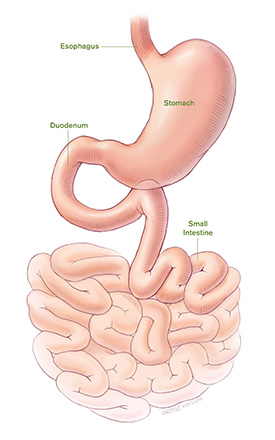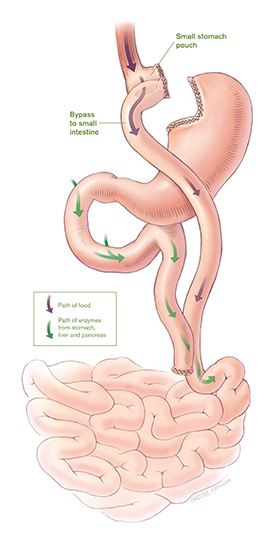Gastric Bypass Surgery
Gastric Bypass Surgery for Weight Loss
Gastric Bypass is one of the most common weight loss surgeries provided by the highly skilled bariatric surgeons of Loyola Medicine.
Gastric Bypass, also known as Roux-en-y, is a minimally invasive, laparoscopic procedure used to help significantly overweight individuals attain a healthy weight.
Gastric Bypass restricts the amount of food you can eat, thereby enabling you to eat less. Weight loss specialists at Loyola are committed to partnering with you to help you determine if Gastric Bypass surgery is the right weight loss tool for your particular needs.
Benefits of Gastric Bypass Surgery
Gastric Bypass surgery is generally used for individuals who are severely overweight and who have not been able to lose weight with diet and regular exercise. If you have a BMI (body mass index) of 40 or higher or have a BMI of 35 or higher coupled with weight-related medical conditions, you may be a candidate for Gastric Bypass surgery.
If you and your Loyola surgeon determine that Gastric Bypass surgery is right for you, Loyola’s multidisciplinary team of experts will partner with you to support your weight loss efforts through surgery and beyond.
Gastric Bypass surgery has several benefits, including:
- Greater degree of weight loss than Gastric Sleeve or Lap Band
- Type 2 diabetes, hypertension and other diseases related to excess weight may begin to improve even before you lose weight, due to changes in digestive-system hormones
- No adjustments are needed after surgery, as with Adjustable Gastric Banding surgery
- Able to resume normal activities within two to four weeks
- Improved quality of life
Why Choose Loyola for Gastric Bypass?
Expert weight loss doctors at Loyola have performed a large number of Gastric Bypass surgeries and Loyola is designated as a Comprehensive Center by The American College of Surgeons, making it one of Chicagoland’s premier weight loss centers.
What to Expect with Gastric Bypass
At Loyola, our expert bariatric surgeons use small, minimally invasive incisions to perform this gastric surgery. In a Gastric Bypass, a Loyola bariatric surgeon creates a small stomach pouch by sealing it off from the rest of your stomach, which restricts the amount of food you can eat. Then, the surgeon reroutes your digestive tract to bypass the larger part of your stomach and part of your small intestine.
Though Gastric Bypass is done as a laparoscopic procedure, you may be required to stay at Loyola University Medical Center for two or three days following your surgery.
Our multidisciplinary team of surgeons, bariatricians, nutritionists and psychologists work together to ensure everything is working properly and you have the tools you need to succeed, prior to leaving Loyola.
Before Surgery

After Surgery

Risks of Gastric Bypass Surgery
Gastric Bypass surgery is a major procedure and you may incur the following risks and side effects:
- Possible leaks, bleeding, blood clots, infection and blockage
- Because Gastric Bypass reduces your ability to absorb nutrients, you will need to take supplements for the rest of your life
- You will be required to significantly limit your intake of sugars and starches, or you may experience physical discomfort including vomiting and diarrhea (known as Dumping syndrome)
- Gastric Bypass is a permanent procedure, except in the case of complications
- Sensitivity to certain foods due to changes in your digestive tract
To ensure long-term success of bariatric surgery, you must make permanent healthy changes to your diet and get regular exercise.
Weight Loss Locations at Loyola
Loyola offers medical weight loss opportunities at the Center for Metabolic Surgery and Bariatric Care at Melrose Park, 719 W. North Avenue in Melrose Park, while surgeries are performed at Loyola University Medical Center in Maywood.
Weight loss seminars and support groups are available at several locations across the Chicagoland area. Find all locations.
